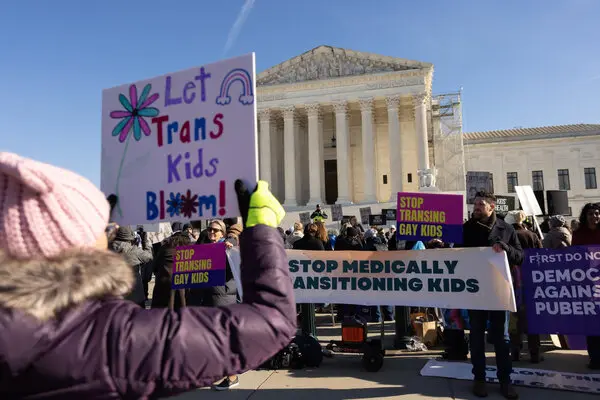The U.S Supreme Court has made a landmark ruling that will have far-reaching repercussions nationwide as the U.S Supreme Court upheld the Tennessee state law that prohibits providing gender transition therapy to children. The 6-3 decision enables states to restrict or ban puberty blockers, hormone therapy, and other interventions on children under 18 years who have gender dysphoria.
In the ruling, passed on June 17, 2025, the Tennessee law, which was introduced as Senate Bill 1 (SB1) in the state, is upheld and criminalizes the practice of gender-affirming care among minors by their doctor. The decision is likely to affect the passage of similar laws in more than 25 American states, in which there are currently bills introduced against the transgender community.
A Divided Court and a Heated National Debate
The case was formally referred to as United States v. Skrmetti, is the first case in which the Supreme Court has called upon the legality of bans on transgender healthcare among youth. The challenge to the law was made by three transgender teenagers, the members of their families, and even a Tennessee physician who stated that SB1 was in contrast with the Equal Protection Clause of the Constitution because it discriminated based on sex and gender identity.
The conservative majority of the Court, headed by Chief Justice John Roberts, did not agree. In the majority opinion, Roberts said Tennessee law does not single out transgender individuals but instead represents an inherently cautious attitude towards what he termed an “ongoing scholarly debate between medical experts.” He underscored the purpose of the law to put on hold irreversible medical procedures on minors until further clinical agreement is achieved.
Tennessee reached the conclusion that medical experts are currently divided about how puberty blockers and hormones should be used to treat gender dysphoria in terms of the balance between risks and benefits, Roberts wrote. That doubt is responsive to a ban on such treatments by SB1.
Strong Dissent From Liberal Justices
The Court’s three liberal justices—Sonia Sotomayor, Elena Kagan, and Ketanji Brown Jackson—issued a sharp dissent. In a powerful opinion delivered from the bench, Justice Sotomayor criticized the majority for what she described as a direct attack on transgender youth and their families.
Sotomayor wrote that the ruling “does in fact create medical discrimination on the basis of sex” and accused the Court of abandoning vulnerable children “to political whims.” Her opinion highlighted the psychological and medical risks that transgender teens may face when denied access to gender-affirming care, which is supported by major medical organizations including the American Academy of Pediatrics and the Endocrine Society.
“[The Court] authorizes, without second thought, untold harm to transgender children and the parents and families who love them,” Sotomayor declared.
Federal Government and Biden Administration Response
The administration of President Joe Biden had supported the plaintiffs in the case, arguing that the Tennessee law violated constitutional protections and overstepped state authority in matters of personal medical care. After the ruling, the White House issued a statement expressing disappointment and reiterating its commitment to protecting LGBTQ+ rights.
“Today’s decision undermines the well-being of transgender youth and their families,” the statement read. “We will continue to advocate for the dignity, health, and safety of every American, regardless of gender identity.”
In contrast, conservative groups and many Republican lawmakers applauded the ruling as a victory for parental rights and medical caution. They argued that irreversible medical treatments should not be made available to minors and welcomed the court’s recognition of state sovereignty in health policy.
Broader Implications Across the U.S.
Tennessee’s SB1 is just one of many laws passed in recent years seeking to regulate or prohibit gender-affirming care for minors. At least 25 states have introduced or enacted similar legislation, and lower courts have issued conflicting decisions. The Supreme Court’s ruling now provides a legal precedent that will likely be cited in future litigation nationwide.
Advocates warn that the decision could have a chilling effect on the availability of care even in states where it is still legal, as providers may fear future restrictions or lawsuits. Meanwhile, families of transgender youth are facing difficult decisions about whether to seek care in other states, relocate entirely, or forgo treatment altogether.
What’s Next?
With this decision, the Supreme Court has solidified a new legal standard allowing states to intervene in medical decisions involving transgender minors. While it does not mandate that states ban such care, it removes one of the most significant constitutional arguments against those bans.
Legal scholars expect further challenges at the state level and possible efforts to introduce federal protections through legislation. However, with the current political and judicial landscape, the future of gender-affirming care for minors in America remains uncertain.
Conclusion
The Supreme Court’s ruling in favor of Tennessee’s SB1 has marked a turning point in the legal status of transgender healthcare for youth in the United States. It affirms the right of individual states to prohibit gender-affirming medical treatments for minors, despite opposition from families, doctors, and national health organizations.








